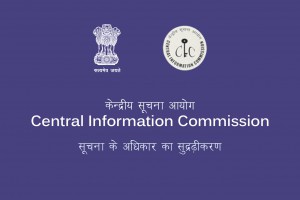Central Information Commission (CIC): Neeraj Kumar Gupta (Information Commissioner) held that:
“Since filing of the Income Tax Returns by an individual with the Income Tax Department is not a public activity and rather it is in the nature of an obligation which a citizen owes to the State viz. to pay his taxes, this information could not be disclosed to the appellant in the absence of any larger public interest.”
In the instant application, the appellant sought the following information from the CPIO, Income Tax Officer:
- “Please inform name and branch address of all those banks wherein my spouse Ms Mamta Arora was having account, at any point of time, during the financial years 2012-2013 to 2017-2018, the information is requested financial year-wise, the date of opening and closure of each bank account concerned be also informed and if any of the account is functional till the date of disposal of this application, then its functional status be also informed. The PAN card number of my spouse is APSPM8586N and her Aadhaar Card number is 319568028653.
- Please provide details as to name and branch address of all those banks wherein my spouse Ms Mamta Arora has held any account, at any point of time, during the present financial year 2018- 2019. Date of opening and closure of each bank account concerned be also informed and if any of the bank accounts is functional till the date of disposal of this application, then its functional status is also informed.
- Please inform what were the income tax slabs, for all the categories i.e. males, females, senior citizens etc. during the financial years 2012-2013 to 2017-2018, for assessment of income tax on the annual income of any resident Indian individual Etc.”
On being dissatisfied with CPIO’s response, appellant filed the instant second appeal before the Commission requesting to take appropriate legal action against the CPIO under Section 20 of the RTI Act and also to direct him to provide the sought-for information.
Decision
Commission observed that the opening words of Section 11 of the RTI Act are “CPIO…intends to disclose” which indicate that the procedure of Section 11 has to be followed only if CPIO intends to disclose the third party information.
Bench deduced that the CPIO is expected to follow the procedure of Section 11 when he “intends to disclose any information on record”.
Since the CPIO found no merit in disclosure, hence Section 11 was not invoked. Further, with regard to applicability of Section 8(1)(j) of the RTI Act, 2005 for non-disclosure of the third party bank details and Income Tax returns Commission referred to the Supreme Court’ decision in Girish Ramchandra Deshpande v. Central Information Commission, (2013) 1 SCC 212.
Legal Issue
Whether the appellant claiming to be the legally wedded husband is entitled to seek information regarding his wife’s bank details and income tax returns?
To answer the stated question, Commission referred to the decision of Delhi High Court in Vijay Prakash v. UOI,2009 SCC OnLine Del 1731, wherein it was clarified that in a private dispute between husband and wife, the basic protection afforded by virtue of the exemption from disclosure enacted under Section 8(1)(j) cannot be lifted or disturbed unless the petitioner is able to justify how such disclosure would be in ‘public interest’.
Commission referred to the following decisions in regard to the disclosure of the information as sought in the instant application was of not larger interest:
[Bombay High Court] Shailesh Gandhi v. CIC, WP No. 8753 of 2013
[Delhi High Court] Naresh Kumar Trehan v. Rakesh Kumar Gupta, WP(C) No. 85 of 2010, 24-11-2014.
[Delhi High Court] Harish Kumar v. Provost Marshall, LPA No. 253 of 2012, 30-03-2012.
In light of Section 2(n) of the RTI Act, 2005 bench stated that Ms Mamta Arora being a person other than the RTI applicant came within the definition of ‘third party’.
Hence, while concluding the decision, Commission held that the in view of the above-decision, Bench opined that in the absence of any larger public interest in the matter, the appellant was not entitled to seek information regarding the bank details and income tax returns of his wife which is exempted under Section 8(1)(j) of the RTI Act.
Appeal was disposed of in view of the above. [Pawan Kumar Saluja v. CPIO, Income Tax Officer; Second Appeal No. CIC/CCITD/S/2019/120284; decided on 05-01-2021]

